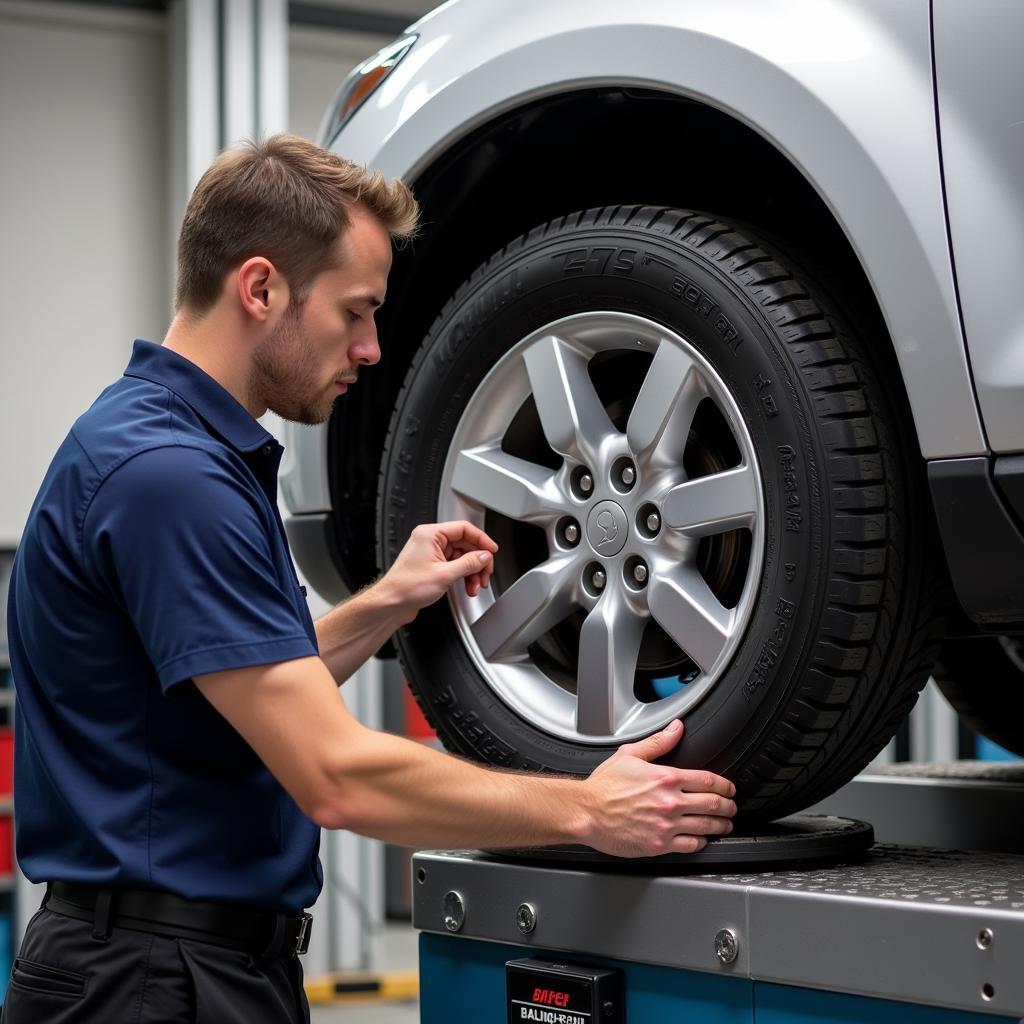Car Full Service Include Wheel Balancing: What Does it Mean?
A car full service often includes wheel balancing, but what does that entail and why is it important? Understanding what’s included in a full car service, particularly wheel balancing, can save you money and ensure your vehicle runs smoothly. This article will delve into the intricacies of a full car service, focusing on the crucial role of wheel balancing.
What Does a Full Car Service Entail?
A full car service is a comprehensive check-up and maintenance procedure designed to keep your vehicle in optimal condition. It goes beyond a basic oil change and tire rotation, encompassing a thorough inspection and servicing of various crucial components. While the specific services offered can vary slightly between garages, a typical full service will include checks on the engine, brakes, steering, suspension, lights, and much more. Importantly, a full car service often includes wheel balancing, a key factor in ensuring a comfortable and safe driving experience.
Why is Wheel Balancing Included in a Full Service?
Wheel balancing is a crucial part of vehicle maintenance and contributes significantly to tire longevity and overall driving comfort. Unbalanced wheels can lead to vibrations, uneven tire wear, and increased stress on suspension components. By including wheel balancing in a full service, mechanics can identify and correct any imbalances, preventing these potential problems.
 Wheel Balancing Process
Wheel Balancing Process
The Importance of Wheel Balancing
Wheel balancing involves adjusting the weight distribution of a wheel and tire assembly to ensure that it spins smoothly at high speeds. This process involves attaching small weights to the wheel rim to counterbalance any heavy spots. Proper wheel balancing minimizes vibrations, reduces wear and tear on tires and suspension components, and improves fuel efficiency.
What are the Signs of Unbalanced Wheels?
Recognizing the signs of unbalanced wheels can help you address the issue promptly and prevent further damage to your vehicle. Common symptoms include:
- Vibration in the steering wheel, floorboard, or seat
- Uneven tire wear
- Reduced fuel economy
- Increased stress on suspension components
How Often Should You Get Your Wheels Balanced?
It’s generally recommended to have your wheels balanced every 5,000 to 7,000 miles, or whenever you get new tires installed. However, if you notice any of the symptoms mentioned earlier, it’s essential to have your wheels checked and balanced as soon as possible.
The Benefits of Regular Wheel Balancing
Regular wheel balancing offers numerous benefits, including:
- Extended tire life
- Improved fuel efficiency
- Enhanced driving comfort
- Reduced stress on suspension components
- Increased safety
Understanding the Full Car Service Checklist
While wheel balancing is a crucial component, understanding the full scope of a car full service is essential for proper vehicle maintenance. A comprehensive checklist typically includes inspections and services related to:
- Engine oil and filter change
- Fluid top-offs (brake fluid, coolant, power steering fluid)
- Brake inspection and service
- Steering and suspension check
- Tire rotation and pressure check
- Lighting system inspection
- Exhaust system check
- Battery test
Conclusion: Prioritizing Wheel Balancing within a Car Full Service
Including wheel balancing in a car full service is crucial for maintaining optimal vehicle performance, safety, and tire longevity. Understanding what a full car service includes, especially the significance of wheel balancing, empowers car owners to make informed decisions about their vehicle maintenance. Regular servicing, including wheel balancing, ensures a smooth, comfortable, and safe driving experience while extending the life of your vehicle.
FAQ:
- What is included in a car full service include wheel balancing? (A full service includes checks on engine, brakes, steering, suspension, lights, and importantly, wheel balancing.)
- How often should I get a full car service? (Every 12 months or 12,000 miles, whichever comes first.)
- What are the signs of unbalanced wheels? (Vibrations, uneven tire wear, reduced fuel economy.)
- How much does wheel balancing cost? (Typically between $15 and $50 per wheel.)
- Can I drive with unbalanced wheels? (Yes, but it can damage your car and reduce tire life.)
- What happens during wheel balancing? (Small weights are attached to the wheel rim to counteract heavy spots.)
- Why is wheel balancing important? (It minimizes vibrations, reduces wear and tear, and improves fuel efficiency.)
For further information and assistance, please contact us via WhatsApp: +1(641)206-8880, Email: [email protected], or visit us at 456 Oak Avenue, Miami, FL 33101, USA. Our customer service team is available 24/7.
